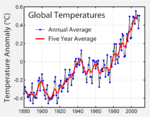Portal:Environment/Selected article/1
Global warming is the increase in the average temperature of Earth's near-surface air and oceans since the mid-20th century and its projected continuation. According to the 2007 Fourth Assessment Report by the Intergovernmental Panel on Climate Change (IPCC), global surface temperature increased 0.74 ± 0.18 °C (1.33 ± 0.32 °F) during the 20th century. Most of the observed temperature increase since the middle of the 20th century has been caused by increasing concentrations of greenhouse gases, which result from human activity such as the burning of fossil fuel and deforestation.
Climate model projections summarized in the latest IPCC report indicate that the global surface temperature is likely to rise a further 1.1 to 6.4 °C (2.0 to 11.5 °F) during the 21st century. An increase in global temperature will cause sea levels to rise and will change the amount and pattern of precipitation, probably including expansion of subtropical deserts. Warming is expected to be strongest in the Arctic and would be associated with continuing retreat of glaciers, permafrost and sea ice. Other likely effects include changes in the frequency and intensity of extreme weather events, species extinctions, and changes in agricultural yields.

